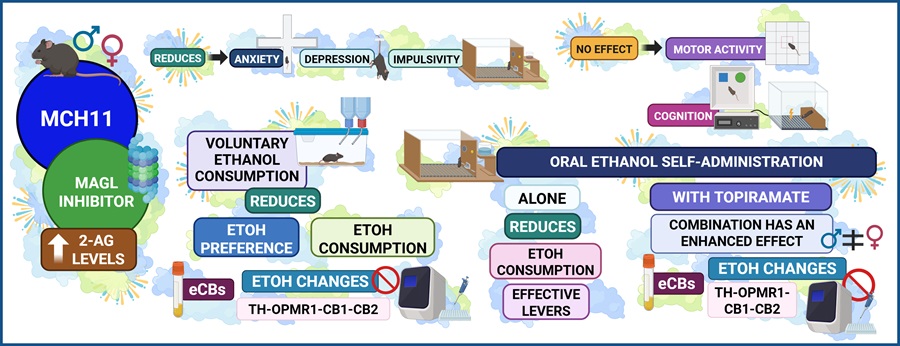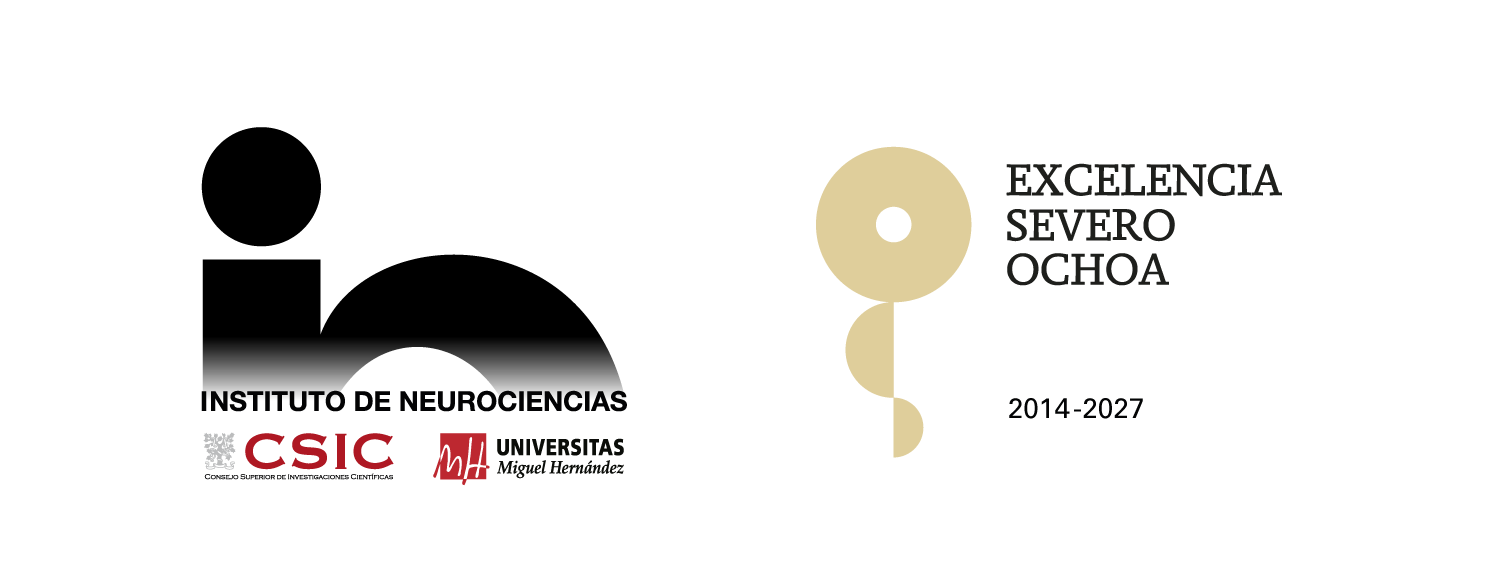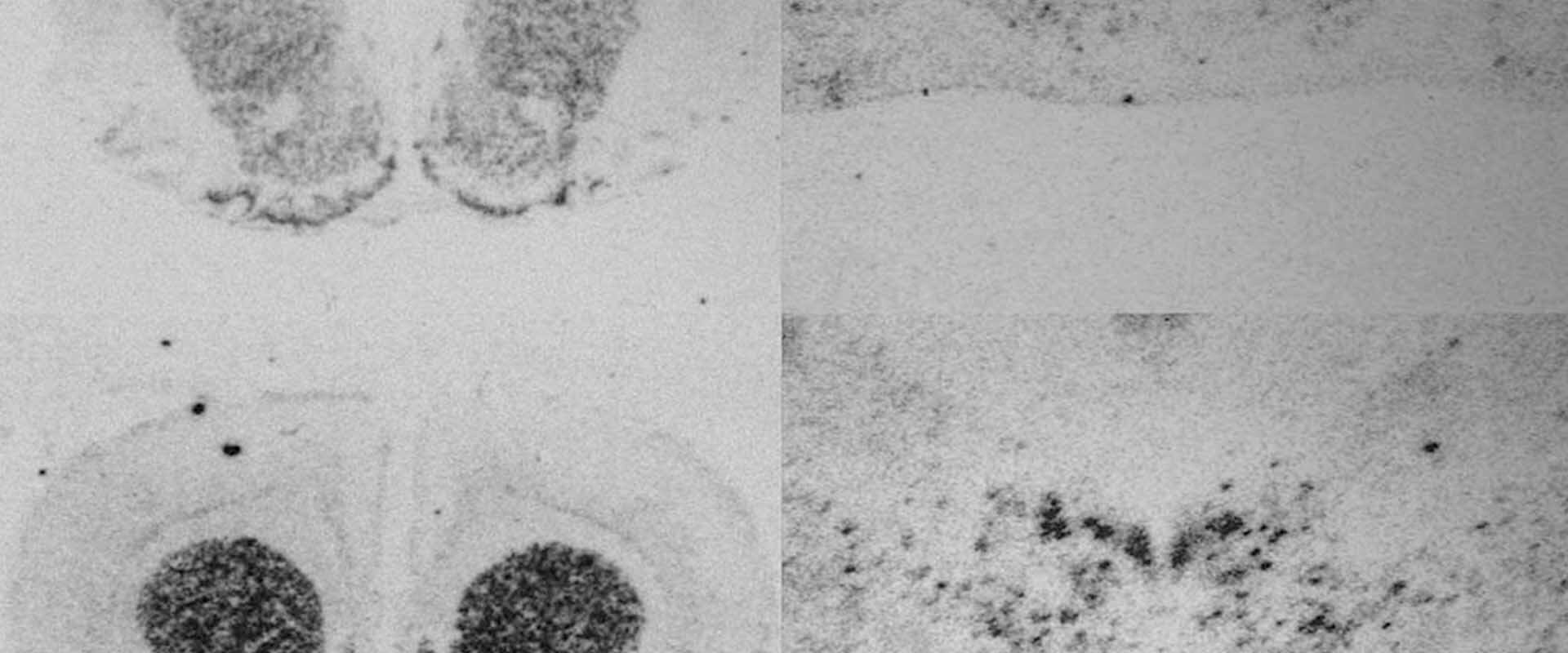MCH11, a new monoacylglycerol lipase inhibitor, reduces ethanol consumption and motivation to drink in mice, with sex-dependent differences.
Researchers at the Institute of Neurosciences UMH–CSIC demonstrate the effectiveness of a new treatment for alcoholism in mice
• A new experimental compound reduces alcohol consumption and the anxiety associated with withdrawal in animal models.
• The molecule, named MCH11, acts on the endocannabinoid system to restore the balance of brain signals related to well-being and motivation
(Photo: IN UMH-CSIC researchers Daniela Navarro, Mª Salud García Gutiérrez, Jorge Manzanares, Abraham Torregrosa and Francisco Navarrete. Source: IN UMH-CSIC.)
A new compound tested at the Miguel Hernández University of Elche (UMH) in Spain shows promising effects in reducing alcohol consumption and motivation to drink in mice, with marked sex-dependent differences in efficacy. Although MCH11 is not yet available for human use, it could pave the way for personalized treatments of alcohol use disorder.
The results, published in the scientific journal Biomedicine & Pharmacotherapy, are the outcome of four years of work by the Translational Neuropsychopharmacology of Neurological and Psychiatric Diseases Laboratory, led by Jorge Manzanares at the Institute for Neurosciences (IN), a joint center of UMH and the Spanish National Research Council (CSIC). The team is also affiliated with the Alicante Institute for Health and Biomedical Research (ISABIAL) and the Primary Care Addiction Research Network (RIAPAD).
Alcohol use disorder is one of the most prevalent addictions worldwide and causes approximately 2.6 million deaths annually. “However, current therapies show serious limitations”, says researcher Abraham Torregrosa, first author of the study. He explains that up to 70% of patients relapse into alcohol use within the first year of treatment.
To seek a more effective pharmacotherapy, the investigators focused on the endocannabinoid system, a signalling network linking the nervous system to the rest of the organism, and involved in the regulation of pleasure, motivation, and stress, all key processes in alcohol addiction. In people with alcohol use disorder, the system becomes imbalanced, reducing levels of molecules such as 2-arachidonoylglycerol (2-AG), which is implicated in well-being and impulse control.
The molecule studied at UMH, MCH11, acts as an inhibitor of monoacylglycerol lipase, an enzyme that degrades 2-AG. By blocking this enzyme, the amount of 2-AG available in the brain increases, reducing both the need to drink and withdrawal symptoms. “Our results show that MCH11 acts on nervous-system mechanisms that help control the drinking impulse, but without undesirable side-effects,” at least in mice and at the doses tested, explains UMH Professor Jorge Manzanares, study leader. “This finding is particularly relevant because impulsive behaviours are closely linked with the development and maintenance of alcoholism”, he adds.

The compound MCH11 acts on the endocannabinoid system to reduce the drive to consume alcohol and the withdrawal symptoms in mice. Source: Biomedicine & Pharmacotherapy.
Treatment with MCH11 in mice was shown to be effective and selective, exhibiting anxiolytic and antidepressant properties without impairing motor or cognitive function. However, experiments revealed significant differences between sexes. “In males, the response to the treatment was effective at low and medium doses, while females required higher doses for similar effects”, explains Manzanares.
The improvement is visible not only behaviourally, but also genetically. “We know that certain genes are altered in alcohol use disorder, and we found via PCR analysis that MCH11 corrects these alterations in mice of both sexes, although females require a higher dose”, adds Torregrosa.
The team also tested a combined treatment of MCH11 with topiramate, a medication already used clinically for alcohol addiction. “We found that the combination of both compounds is the most effective,” notes Manzanares, who highlights MCH11’s potential as part of a personalized, sex-adapted combined therapy. “The results are very promising, but still preliminary; there is a long road from demonstrating drug efficacy in animal models to applying it in patients”, the UMH Professor concludes.
The research was made possible thanks to funding from the Ministry of Science, Innovation and Universities; the Spanish State Research Agency; the Severo Ochoa Program for Centers of Excellence; the RIAPAD network (Carlos III Health Institute); and ISABIAL.
Source: UMH Communications Service/ Institute for Neurosciences UMH-CSIC (in.comunicacion@umh.es)


 Español
Español
